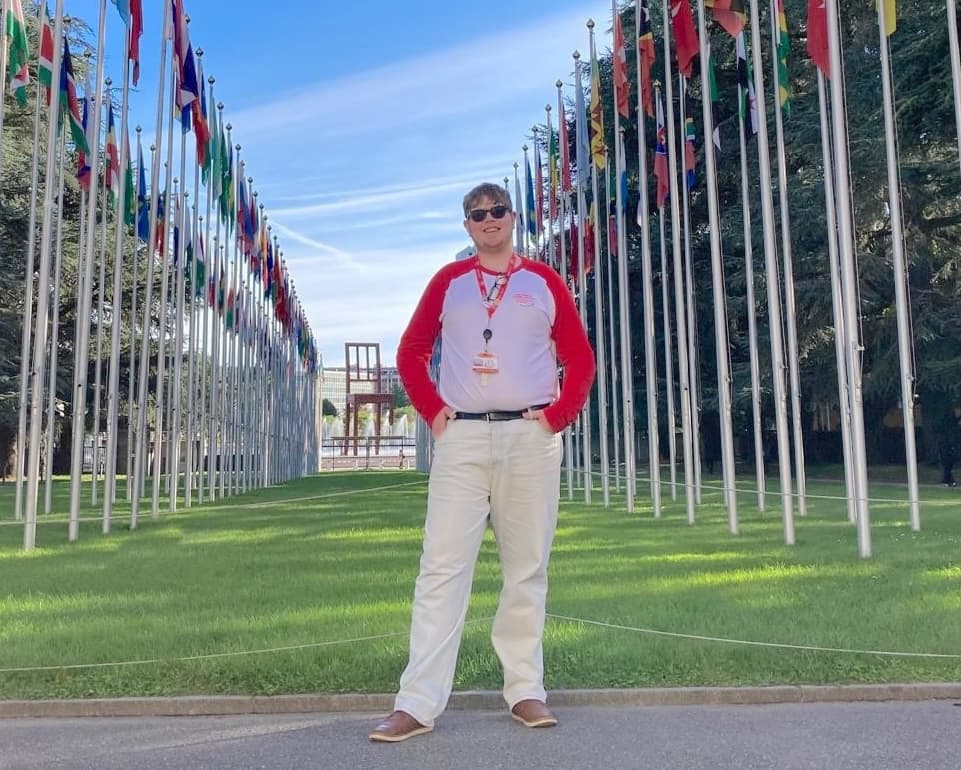The Office of the United Nations High Commissioner for Human Rights (OHCHR) recently held a landmark expert panel in Geneva, marking the first time children actively shaped discussions on a potential new protocol to the Convention on the Rights of the Child (CRC). The session, Participation of Children: Children’s Perspectives and Recommendations, featured five young speakers. The event was co-moderated by Chris Mburu, Senior Human Rights Officer at OHCHR, alongside one of the children, symbolising the equal partnership between adults and children in this historic dialogue.
Borders College student ambassador Robert Punton was selected to attend and speak at the conference. Robert highlighted both the progress and the challenges in Scotland’s pre-school provision by saying:
“For more than two decades, children in Scotland have had access to free pre-school education. Parents and carers have been able to choose between pre-school classes within primary schools, state-run nurseries, or private providers. Today, funded places cover 1,140 hours per year – the equivalent of around 22 hours each week all year round, or 30 hours if used only during term time. These places are available to children aged three to five, as well as some two-year-olds. Parents also have the option to pay for additional hours if they need them, and in some cases, financial support is available.
“However, I can see that barriers remain that prevent some children from fully accessing this entitlement. Social attitudes play a role – some families still undervalue the importance of pre-school education – and rigid scheduling often doesn’t fit the realities of working parents. I know many families who prefer to rely on relatives for childcare instead.
“For children with disabilities, the challenges can be even greater. Buildings are not always fully accessible, classrooms can be cramped, and there is still a lack of specialist provision for children with additional needs such as Autism or ADHD.
“Transport is another significant issue, especially in rural and island communities, where nursery places can be difficult to reach. Unlike school-aged children, those in pre-school are not entitled to council-provided transport, and I know some families who really struggle to make attendance possible.
“Ultimately, I believe these challenges reflect a wider societal perception: pre-school education is not always valued in the same way as formal schooling. Until that changes, inequalities in access are likely to remain.”
The panel was convened following the Human Rights Council’s adoption of a resolution establishing an Open-ended Intergovernmental Working Group to draft a possible optional protocol. The proposed instrument seeks to explicitly affirm that the right to education includes early childhood care and education, commit governments to provide at least one year of free public pre-primary education, and guarantee free public secondary education. Notably, the resolution required that children be directly consulted, ensuring their perspectives inform the drafting process.
In the lead-up to the session, OHCHR consulted with approximately 8,000 children worldwide, gathering views through discussions and written submissions. Their feedback, published ahead of the meeting, revealed affordability as a central barrier to education. Costs such as fees, uniforms, transport and supplies were consistently highlighted as obstacles, particularly for marginalised groups.
Talking about his experience, Robert went on to say:
“I was honoured to be one of only five young people invited to the United Nations Convention in Geneva, where I had the privilege of contributing to meaningful discussions whilst at the same time gaining invaluable insights into international collaboration alongside fellow delegates from around the world.”
Robert is now back at college studying Early Education & Childcare and looking forward to the new academic year.

